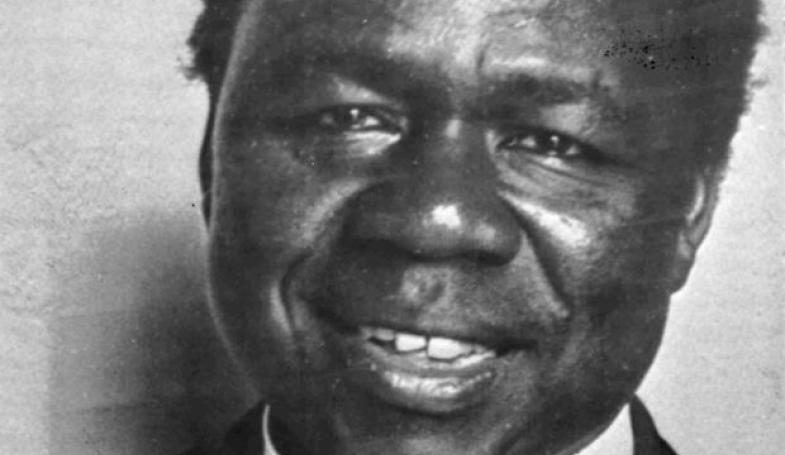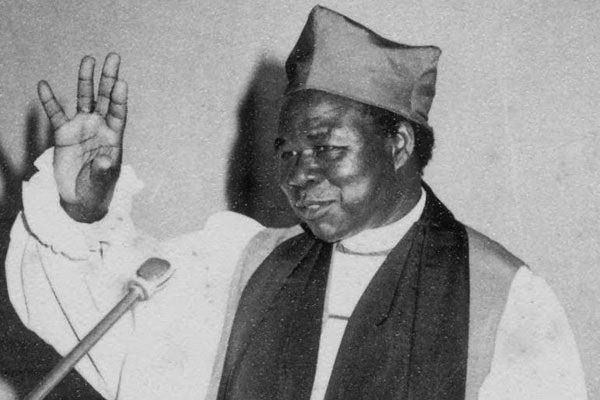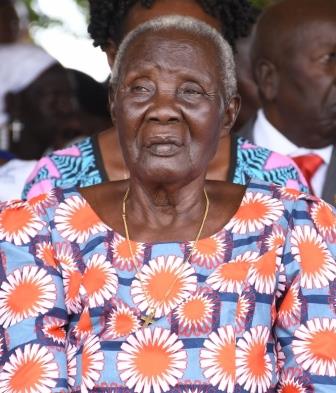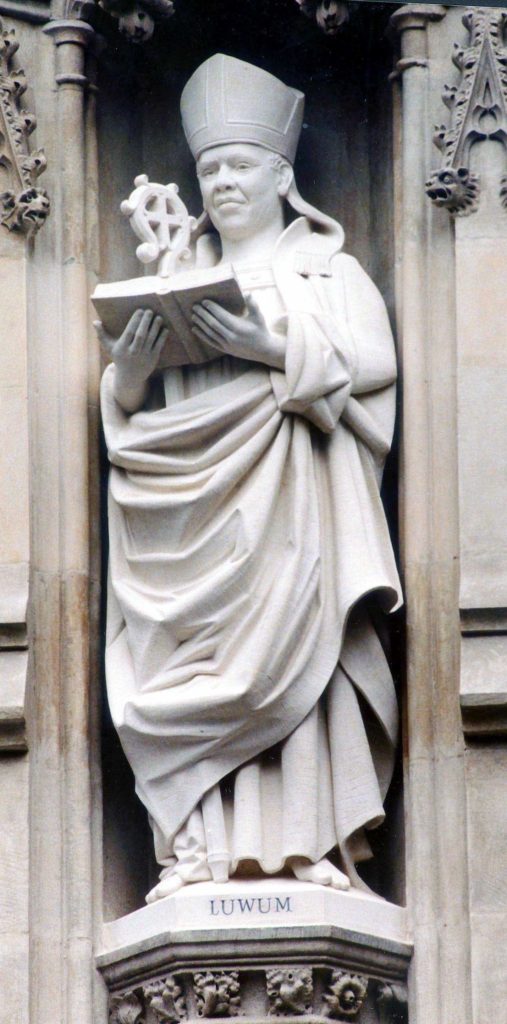Ugandan Anglican Martyr, Archbishop Janani Luwum
Features
“I am inspired by the life Archbishop Luwum led, his courage and the impact he has had on the Church, both in Uganda and globally…The witness of his life challenges me not just to be aware, but to be emboldened by his courage to step up in words and deeds,” says Parish of North Pine’s Sarah Gover on Archbishop Janani Luwum, who is commemorated in our Lectionary on Wednesday 3 June

Story Timeline
Saints and martyrs
- Anselm of Canterbury
- ‘Utterly orthodox and utterly radical’
- St Cuthbert – opening the door to the heart of heaven
- The man who would be king
- The saint and the sultan
- Dietrich Bonhoeffer: faith as unsovereign attention
- The life and legacy of Mary Sumner
- Mary, Mother of Our Lord
- Anglican Church remembers missionaries on New Guinea Martyrs Day
- Julian of Norwich: ‘all shall be well’
- A maverick medieval mystic for modern times
- Meet a saint for our times – Evelyn Underhill
- Benedict of Nursia
- Lady Eliza Darling – pioneering social reformer and evangelical Anglican
- Hildegard of Bingen
I have noticed that there seems to be distinct periods that God uses to profoundly impact a wide range of people. One of these is the East African Revival that permeated East Africa between the late 1920s and 1930s. A few years ago I was privileged to attend a celebration of revival movement at its birthplace in Gahini, Rwanda. Throughout the celebration, speakers mentioned famous and influential African leaders who had been impacted by the revival and one of those was the Ugandan Anglican martyr Archbishop Janani Luwum (1922-1977).
Janani Luwum was born in a small Ugandan village in 1922 and is now seen as one of the most influential leaders of the modern church in Africa. He trained as a teacher and possessed uncommon leadership and negotiation skills. While at the teachers training college, “the students staged a strike complaining about poor food diet provided at the BTTC [the college]. Luwum persuaded them not to destroy the college properties but to wait as he negotiated with the vice principle [sic]…The meeting that they held subsequently ended in a compromise that pleased all parties involved.”

“Janani Luwum was born in a small Ugandan village in 1922 and is now seen as one of the most influential leaders of the modern church in Africa” (Image courtesy of Daily Monitor)
In 1948 he met Christ through the East African Revival movement. The defining revival features of a personal relationship with Christ, prayer and bible study in small groups and then sending out of group members to preach the gospel became cornerstones to Janani Luwum’s life and ministry. Every Sunday he used to preach in the market place. One Sunday, with tears streaming down his face he said, “The Spirit of the Lord has shown me that many educated men have run away from the church. They want the church to fall and to fall alone. Today, I promised before God and all of you assembled here, that if the church is falling, she will fall on me. I surrender myself to the church.” After this he fell to the ground and wept, knowing that God was calling him to full-time ministry. He was ordained within eight years of his conversion.
Advertisement
21 years after his ordination he was consecrated Bishop of Northern Uganda. I have been to an African consecration. They are huge colourful musical events attracting thousands of people. One of the people in attendance at his consecration was the then Commander of the Ugandan Armed Forces, Idi Amin. During his time as Diocesan Bishop, Luwum worked to improve one of the poorest in the country by establishing many community development projects, empowering clergy to challenge injustice and violence, and being a voice for the voiceless. One programme he established supported students who had been orphaned by war.
Two years after Bishop Luwum’s consecration, Idi Amin staged a coup and took over the Ugandan Government. The reign of Idi Amin is seen as one of the most brutal of all African dictators in modern history, one marred by immense suffering, violence and abuses of human rights. Under President Amin, all Asians in the country were expelled, the economy collapsed, inflation rose and thousands were brutally murdered. People survived by not trusting anyone, putting their heads down, and trying to avoid being noticed. Church leaders throughout the country, however, spoke out against the government’s brutality and unjust treatment of the people. One of those was Bishop Luwum.
Advertisement
The Archbishop of York John Sentamu was mentored by Bishop Luwum during this time. He said that for Bishop Luwum, “abdication of the exercise of power was not a moral option. For him, abdication was as much an abuse of power as was the oppression of others with one’s power.” He goes on to say that “Janani Luwum was one good man who could not keep silent in the face of the cruelty and oppression practised by Idi Amin and his soldiers.”
After five years as Bishop of the Northern Diocese, Bishop Luwum was enthroned as Primate of (what was then) the Province of Uganda, Rwanda, Burundi, and Boga-Zaire.
Archbishop Luwum was a frequent visitor to Idi Amin, delivering letters of protest against the arbitrary killings and disappearances, so by 1977 President Amin had begun to see the church as an enemy of the state, and Bishop Luwum one of the main leaders.
In early February 1977, the tension between Idi Amin and Archbishop Luwum rose to an extreme level. Other Church leaders encouraged the Archbishop to leave the country. Although grateful for their concerns and offers from various embassies for help, his reply was always the same: “If I, the Shepard [sic], flee, what will happen to the sheep?”
A radio announcement on 15 February 1977 summoned the Archbishop, and all the other Bishops and senior public servants, to appear at a government-controlled building in the capital the following day ostensibly for a “very important event”. The ‘important event’ turned into a shambolic trial where false accusations were laid before Church leaders. Archbishop Luwum was accused of plotting with the former president to overthrow the government. Although the other Bishops were released, Archbishop Luwum was told to stay as the President wanted to see him alone. What happened next is a matter of conjecture and speculation. Early the next morning the government released a statement that Bishop Luwum and two senior government officials had crashed their car while trying to escape. Bishop Luwum’s body was sent to his home village of Mucwini for burial. He was survived by wife Mary Lawinyo Luwum and nine children.

Janani Luwum was survived by wife Mary Lawinyo Luwum (pictured) and nine children, and buried in his home village of Mucwini. ‘Mama Mary’ died in August 2019 at the age of 93 (Image courtesy of Anglican Ink)
When his family examined his body, they found evidence that discredited the government’s story, including evidence of fatal gunshots. It is now widely accepted that they were murdered on the orders of President Amin, and Archbishop Luwum is now credited as one of the modern martyrs of the Anglican Church, with his statue being one of the 10 modern martyrs above the Great West Door of Westminster Abbey.

Statue of Janani Luwum above the West Entrance of Westminster Abbey (Copyright: Dean and Chapter of Westminster)
Four months after his murder, the churches in Uganda came together to celebrate the centennial of the first preaching of the Gospel in Uganda. More than 25,000 Christians gathered to celebrate, many of the participants drawn back to their faith because of the life and courage of Archbishop Luwum. Archbishop Luwum’s faith gave others the courage to stand up for what they believed in.
Two years later Idi Amin was overthrown by the Tanzanian Army but the murder of Archbishop Luwum is widely seen as the beginning of the end for Amin.
The fourth Mark of Mission calls us “to transform unjust structures of society, to challenge violence of every kind and pursue peace and reconciliation.” Bishop Luwum honoured this call in both word and deed, and as a result thousands of people dared to renew their faith and join the Church.
While reading about Archbishop Luwum, I initially doubted the relevance of a martyred African Archbishop to my 21st century Australian life. On reflection, I think his life is of great relevance. I am inspired by the life Archbishop Luwum led, his courage and the impact he has had on the Church, both in Uganda and globally. Reading about Archbishop Luwum has made me more aware of the injustices and the violence that exist. The witness of his life challenges me not just to be aware, but to be emboldened by his courage to step up in words and deeds and to challenge others to do the same.





